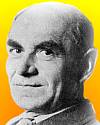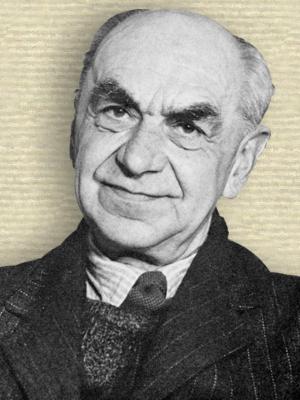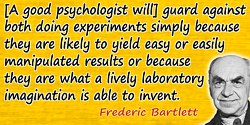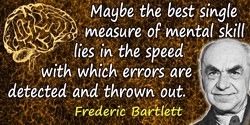 (source)
(source)
|
Sir Frederic Bartlett
(20 Oct 1886 - 30 Sep 1969)
English psychologist who wrote about practical (ergonomic) problems in applied psychology. In his pioneering cognitive approach to understanding human memory, he explained subsequent distortions in recall.
|
Science Quotes by Sir Frederic Bartlett (13 quotes)
A good psychologist has to be able to distinguish strongly between problems of process, which are causal, and problems of structure, which are analytic and descriptive. In particular the statistics adequate for the latter are not sufficient for the former.
— Sir Frederic Bartlett
From archive recording (3 Jun 1959) with to John C. Kenna, giving his recollection of his farewell speech to Cambridge Psychological Society (4 Mar 1952), in which he gave a summary of points he considered to be basic requirements for a good experimental psychologist. Point 5 of 7, from transcription of recording held at British Psychological Society History of Psychology Centre, London, as abridged on thepsychologist.bps.org.uk website.
Every good psychologist must be wise as well as technically efficient. It is rather a lame statement because I don’t know how anybody can learn to be wise. Perhaps a way of putting it is to say that he must know where and how to look for evidence, which will enable him to advance beyond evidence and then to return once more to seek confirming evidence.
— Sir Frederic Bartlett
From archive recording (3 Jun 1959) with to John C. Kenna, giving his recollection of his farewell speech to Cambridge Psychological Society (4 Mar 1952), in which he gave a summary of points he considered to be basic requirements for a good experimental psychologist. End of point 3 of 7, from transcription of recording held at British Psychological Society History of Psychology Centre, London, as abridged on thepsychologist.bps.org.uk website.
Guard against both doing experiments simply because they are likely to yield easy or easily manipulated results or because they are what a lively laboratory imagination is able to invent.
— Sir Frederic Bartlett
From archive recording (3 Jun 1959) with to John C. Kenna, giving his recollection of his farewell speech to Cambridge Psychological Society (4 Mar 1952), in which he gave a summary of points he considered to be basic requirements for a good experimental psychologist. Part of point 4 of 7, from transcription of recording held at British Psychological Society History of Psychology Centre, London, as abridged on thepsychologist.bps.org.uk website.
He [a good psychologist] must be able to give and to take incisive criticism without losing his respect either for himself or for the people and the views that he may try to upset. He has to be tolerant, but not indecisive, to be ruthless, but not unfair, to be honest about his assumptions as he is about his evidence, to ask questions when he doesn’t know and to hazard answers when he is convinced that he does, to give credit where credit is due and not to be too much worried if it seems to him that others do not always return the compliment.
— Sir Frederic Bartlett
From archive recording (3 Jun 1959) with to John C. Kenna, giving his recollection of his farewell speech to Cambridge Psychological Society (4 Mar 1952), in which he gave a summary of points he considered to be basic requirements for a good experimental psychologist. End of point 7 of 7, from transcription of recording held at British Psychological Society History of Psychology Centre, London, as abridged on thepsychologist.bps.org.uk website.
I want to see a generation of psychologists who can stand alongside the best of all the other scientists, not making any pretence to having discovered the master key to all knowledge.
— Sir Frederic Bartlett
From archive recording (3 Jun 1959) with to John C. Kenna, giving his recollection of his farewell speech to Cambridge Psychological Society (4 Mar 1952), in which he gave a summary of points he considered to be basic requirements for a good experimental psychologist. From transcription of recording held at British Psychological Society History of Psychology Centre, London, as abridged on thepsychologist.bps.org.uk website.
In a training period I continue to believe that the best start is with the experimentally prepared situation. Principally because it is in this that it is easiest to illustrate controlled variability, but there is no compelling reason why all experiments should be shaped to the conventional forms of the psychophysical methods. In any case the psychologist must refuse to be limited by those formalised statements of scientific experiment, which grew up with the logical methodologists of the mid-19th century. There are no psychological experiments in which the conditions are all under control; in which one condition can be varied independently of the rest, or even in which the concomitant variation of two specified conditions alone can be arranged and considered.
— Sir Frederic Bartlett
From archive recording (3 Jun 1959) with to John C. Kenna, giving his recollection of his farewell speech to Cambridge Psychological Society (4 Mar 1952), in which he gave a summary of points he considered to be basic requirements for a good experimental psychologist. Part of point 3 of 7, from transcription of recording held at British Psychological Society History of Psychology Centre, London, as abridged on thepsychologist.bps.org.uk website.
It is my view that a psychologist who is really going to get anywhere must respect human behaviour. Not only in the sense of considering it a worthwhile subject to study, but in the much more important sense of being willing to reject flippant and cynical views or at least of regarding them as a not very serious kind of sport and of believing that human beings are fundamentally decent.
— Sir Frederic Bartlett
From archive recording (3 Jun 1959) with to John C. Kenna, giving his recollection of his farewell speech to Cambridge Psychological Society (4 Mar 1952), in which he gave a summary of points he considered to be basic requirements for a good experimental psychologist. Point 6 of 7, from transcription of recording held at British Psychological Society History of Psychology Centre, London, as abridged on thepsychologist.bps.org.uk website.
Maybe the best single measure of mental skill lies in the speed with which errors are detected and thrown out.
— Sir Frederic Bartlett
In 'The Measurement of Human Skill', British Medical Journal (21 Jun 1947), 1, No. 4511, 879. The article is the text of the second (23 Jan 1947) of two Oliver-Sharpey Lectures given by Bartlett at the Royal College of Physicians of London.
Remembering is not the re-excitation of innumerable fixed, lifeless and fragmentary traces. It is an imaginative reconstruction, or construction, built out of the relation of our attitude towards a whole active mass of organised past reactions and experience, and to a little outstanding detail which commonly appears in image or in language form. It is thus hardly ever really exact, even in the most rudimentary cases of rote recapitulation, and it is not at all important that it should be so.
— Sir Frederic Bartlett
From the summary section of Chapter 10, 'A Theory of Remembering', Remembering: A Study in Experimental and Social Psychology (1932, 1995), 213.
The first requirement is loyalty to evidence. The evidence may be sought in unprepared situations after the manner of a great many clinicians and of many social psychologists or in technical, technologically prepared situations or it may be sought in experimentally prepared situations.
— Sir Frederic Bartlett
From archive recording (3 Jun 1959) with to John C. Kenna, giving his recollection of his farewell speech to Cambridge Psychological Society (4 Mar 1952), in which he gave a summary of points he considered to be basic requirements for a good experimental psychologist. Point 2 of 7, from transcription of recording held at British Psychological Society History of Psychology Centre, London, as abridged on thepsychologist.bps.org.uk website.
There is very little hope for a psychologist who is not prepared to become an effective collaborator.
— Sir Frederic Bartlett
From archive recording (3 Jun 1959) with to John C. Kenna, giving his recollection of his farewell speech to Cambridge Psychological Society (4 Mar 1952), in which he gave a summary of points he considered to be basic requirements for a good experimental psychologist. Part of point 7 of 7, from transcription of recording held at British Psychological Society History of Psychology Centre, London, as abridged on thepsychologist.bps.org.uk website.
There never has been and there never will be a good psychologist who has not got a number of lively interests outside of psychology itself. Or who fails to connect his psychological research and reflection with these other interests. Similarly there never has been and there never will be a good scientific psychologist who has not got at least some specialised training outside of psychology.
— Sir Frederic Bartlett
From archive recording (3 Jun 1959) with to John C. Kenna, giving his recollection of his farewell speech to Cambridge Psychological Society (4 Mar 1952), in which he gave a summary of points he considered to be basic requirements for a good experimental psychologist. Point 1 of 7, from transcription of recording held at British Psychological Society History of Psychology Centre, London, as abridged on thepsychologist.bps.org.uk website.
What we remember, belonging more particularly to some special active pattern, is always normally checked by the reconstructed or the striking material of other active settings. It is, accordingly, apt to take on a peculiarity of some kind which, in any given case, expresses the temperament, or the character, of the person who effects the recall. This may be why, in almost all psychological descriptions of memory processes, memory is said to have a characteristically personal flavour … depending upon an interplay of appetites, instincts, interests and ideals peculiar to any given subject.
— Sir Frederic Bartlett
In Chapter 10, 'A Theory of Remembering', Remembering: A Study in Experimental and Social Psychology (1932, 1995), 213.
See also:





 In science it often happens that scientists say, 'You know that's a really good argument; my position is mistaken,' and then they would actually change their minds and you never hear that old view from them again. They really do it. It doesn't happen as often as it should, because scientists are human and change is sometimes painful. But it happens every day. I cannot recall the last time something like that happened in politics or religion.
(1987) --
In science it often happens that scientists say, 'You know that's a really good argument; my position is mistaken,' and then they would actually change their minds and you never hear that old view from them again. They really do it. It doesn't happen as often as it should, because scientists are human and change is sometimes painful. But it happens every day. I cannot recall the last time something like that happened in politics or religion.
(1987) -- 


